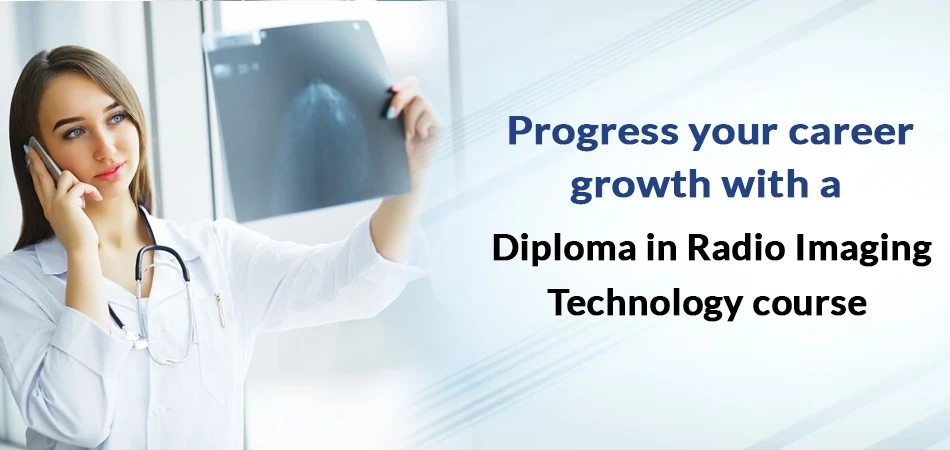Progress Your Career Growth with a Diploma in Radio Imaging Technology Course

In the DRIT program, participants will gain the essential skills and knowledge needed to efficiently work with various types of equipment in radiology and imaging facilities, such as advanced machinery. If you are highly interested in the healthcare industry and Radiology Labs. The majority of the class is dedicated to instruction, assisting in acquiring skills to manage different scenarios and utilize tools efficiently.
Register at the best paramedical college now and seize this opportunity right away.
Benefits of Hands-on experience with the DRIT course
1. Clinical Rotations: Anticipate dedicating a substantial amount of time in practical settings, using your academic understanding in authentic situations. Having practical experience is essential for becoming proficient in imaging methods and comprehending patient care.
2. Equipment Training: You’ll gain practical skills using various imaging modalities, including X-rays, MRI, CT scans, and ultrasound. Learning to operate and troubleshoot this equipment is a key component of your training.
3. Patient Interaction: Interacting with patients is a crucial aspect of your learning. You'll be taught how to clarify processes, guarantee patient satisfaction, and address any issues, improving your communication abilities.
4. Safety Protocols: Understanding radiation safety and protection protocols is vital. Expect training on how to minimize exposure for both patients and yourself while maintaining high-quality imaging standards.
5. Technical Skills Development: You will work on acquiring images, positioning patients, and ensuring images are of a high quality. This will require working with guidance from seasoned radiologic technologists and teachers.
6. Problem-Solving Scenarios: Real-life case studies and simulations will challenge you to think critically and solve problems on the spot, helping you develop the quick decision-making skills necessary in a clinical setting.
7. Interdisciplinary Collaboration: You’ll work alongside other healthcare professionals, learning how radiology fits into the broader medical landscape and the importance of teamwork in delivering patient care.
8. Feedback and Evaluation: Expect regular assessments from instructors and supervisors, providing valuable feedback on your performance and helping you identify areas for improvement.
9. Portfolio Development: Many programs encourage you to create a portfolio of your work and experiences, which can be beneficial when seeking employment post-graduation.
10. Certification Preparation: Your hands-on experience will prepare you for certification exams, ensuring you are well-equipped to enter the workforce with confidence.
Opt Ganesh Paramedical College
Taking a DRIT course in Delhi could result in finding a fulfilling career in the healthcare sector. This is considered a highly lucrative career option for students interested in entering this industry. The increasing demand for paramedical personnel is a result of the ongoing expansion of the industry. Enroll in the top Paramedical College program to become a crucial paramedical health professional who assesses and assists patients in medical settings. Furthermore, CRIT courses, BRIT courses, and MRIT courses. are also accessible. Ensure prompt enrollment at Ganesh Paramedical College.
People also ask
What is a DRIT course?
DRIT stands for Diploma in Radio Imaging Technology. This course will help you to deliver a detailed understanding of the Radiological Lab techniques and provide many job opportunities to the student.
What are the Career opportunities after completing the DRIT course?
After finishing this course you can become a Radiological Lab assistant, research analyst, Radiological Nurse, PhD in radiology Medical officer etc
What is the average salary to be expected after finishing this course?
The average salary varies from 2.5- 6 lakhs depending upon the post and rank.
How to get an inquiry for this course?
You can contact us at PH No-011-47444444 Call Centre NO-011-47333333, Mobile No-9810183948.
Do paramedical courses require NEET?
No, NEET is not required for paramedical courses. However, a few colleges might have university entrance exams for students.
Is there any entrance exam for paramedical courses?
Admission to some of the paramedical courses is based on entrance exams. This includes JIPMER, NEET-UG, MHT CET, etc.
How many years is a Paramedical course?
Certificate courses go on for a duration of 1-2 years while degree courses are for 1-4 years.
Is paramedical a good career?
There are ample job opportunities for paramedical graduates and an increasing demand for trained people in these fields.

